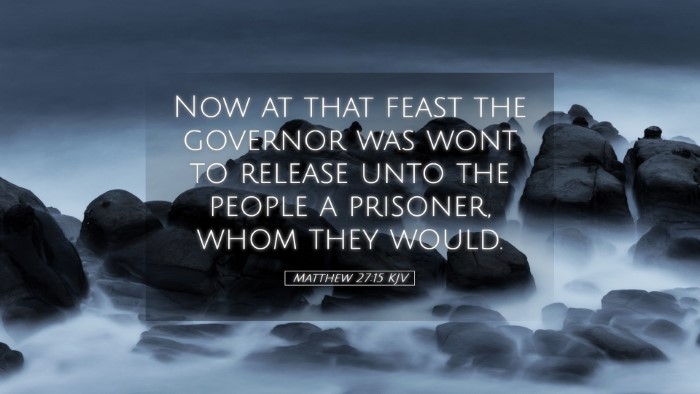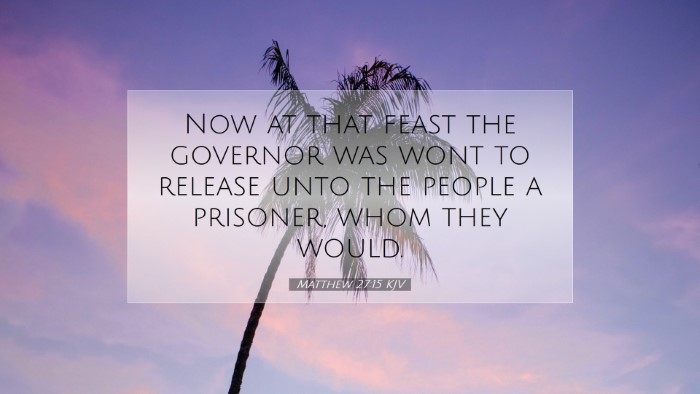Commentary on Matthew 27:15
In the passage Matthew 27:15, we encounter a pivotal moment in the Passion narrative where the fate of Jesus is put to the test through the custom of releasing a prisoner during the Passover festival. The verse reads:
"Now at that feast the governor was wont to release unto the people a prisoner, whom they would."
Contextual Background
This verse is set in the broader context of the events leading up to Jesus' crucifixion. The custom mentioned signifies the Roman practice of offering clemency to a prisoner in honor of the Jewish Passover, a tradition that symbolizes liberation and freedom. This moment also highlights the tension between the Jewish authorities and the Roman governance.
Insights from Public Domain Commentaries
Matthew Henry's Commentary
Matthew Henry explains that the act of releasing a prisoner was a common custom during the Passover, illustrating both the cruelty and the divine plan at work. He notes that this was not merely an indifferent act; rather, it was imbued with a significant weight of choice. The crowd is given the agency to choose between Jesus, who represents innocence and righteousness, and Barabbas, a notorious criminal. This choice reflects the moral and spiritual state of the people at that time, emphasizing the contrast between Christ, the Savior, and Barabbas, the sinner.
Albert Barnes' Commentary
Albert Barnes brings forth additional insights by framing the governor's practice of releasing a prisoner as an act designed to maintain peace with the Jewish populace. He highlights that this was a calculated political maneuver. By allowing the crowd to choose their prisoner, the governor sought to placate the people during a volatile time, aware that a disruption could lead to unrest. Barnes also elucidates the irony of this situation: the very people whom Jesus came to save are presented with this choice, leading many to choose Barabbas, thus fulfilling the prophetic irony of rejection.
Adam Clarke's Commentary
Adam Clarke takes the opportunity to delve deeper into the character of Barabbas. He notes that Barabbas was a rebel and a murderer, representing rebellion against the authority of Rome. Clarke emphasizes the stark choice confronting the people: to release someone who had disrupted societal peace or to set free the Prince of Peace. This juxtaposition serves to illustrate the broader theme of human rebellion against divine order, foreshadowing the ultimate rejection of Jesus by His own people.
Theological Implications
This verse and its surrounding narrative raise important theological questions concerning the choice of the crowd. It invites reflection on the nature of humanity’s rebellion against God. The decision to prefer Barabbas, a figure emblematic of sin and chaos, over the perfect Lamb of God, underscores the consistent biblical theme of rejection and the fulfillment of prophecy concerning the Messiah. It symbolizes how humanity often chooses transient, worldly desires over the eternal salvation offered through Christ.
Application for Today
- Self-Examination: Just as the crowd faced a moment of decision, modern believers are called to reflect on which "prisoner" they choose to free in their lives—Christ or the distractions of the world.
- Responsibility of Witness: Pastors and leaders should guide congregations to recognize and understand the weight of their decisions and the societal implications of their faith.
- Educating Others: This passage provides an opportunity for spiritual education on the nature of Christ's mission and the gravity of rejecting divine truth.
- Encouragement in Rejection: Understanding that Jesus faced rejection supports believers in their struggles; they can find hope knowing their Savior endured similar trials.
Conclusion
Matthew 27:15, while succinct, encapsulates profound themes of human choice, divine sovereignty, and the nature of sin. It serves as a reminder of the constant tug-of-war between righteousness and rebellion faced by individuals and societies throughout history. The insights provided by Matthew Henry, Albert Barnes, and Adam Clarke encourage a deeper reflection on our own choices and the implications they carry in the context of faith and salvation.


